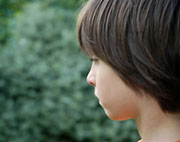- Could Your Grocery Store Meat Be Causing Recurring UTIs?
- Are You Making This Expensive Thermostat Error This Winter?
- Recognizing the Signs of Hypothyroidism
- 10 Strategies to Overcome Insomnia
- Could Artificial Sweeteners Be Aging the Brain Faster?
- Techniques for Soothing Your Nervous System
- Does the Water in Your House Smell Funny? Here’s Why
- Can a Daily Dose of Apple Cider Vinegar Actually Aid Weight Loss?
- 6 Health Beverages That Can Actually Spike Your Blood Sugar
- Treatment Options for Social Anxiety Disorder
Less Flexibility Seen in Brain Wiring of Kids With Autism: Study


When most children take on a task, various brain connections fire up. But scans showed less of this neuro-boosting activity in kids with autism, according to a small new study.
Moreover, children with more severe symptoms of autism displayed even less of this “brain flexibility,” the researchers found.
“This reduced flexibility often causes difficulty when children with autism are faced with new situations,” said study lead author Lucina Uddin, a neuroscientist and assistant professor of psychology at the University of Miami in Florida. “Knowing how the brain responds differently in these scenarios can help us to make transitions easier for these kids.”
The finding — published July 29 in Cerebral Cortex — won’t immediately lead to improvements in prevention, diagnosis or treatment of autism, which is estimated to affect one in 68 children in the United States. Still, it may provide more insight into the mysterious workings of the brain in autism.
People with autism have trouble interacting with others because they can’t interpret many social signals that humans send to one another. They also engage in repetitive behaviors, such as obsessively focusing on one topic, or repeating the same action over and over.
“Based on our recent findings of overconnectivity in the brains of children with autism, I wanted to test the idea that a flexible brain is necessary for flexible behaviors,” Uddin said.
In the new study, researchers performed brain scans on 34 children with autism and 34 typically developing children while at rest and while performing a task — either solving math problems or distinguishing faces from one another. The idea was to include tasks that would — and wouldn’t — significantly challenge kids with autism.
The kids with autism did as well as the others on the tasks. However, “across a set of brain connections known to be important for switching between different tasks, children with autism showed reduced ‘brain flexibility’ compared with typically developing peers,” Uddin said.
The researchers also found a connection between the severity of restricted and repetitive behaviors and the degree of inflexibility.
In the big picture, “the findings may help researchers develop new therapies that target brain flexibility through strategies, tools and games that improve task-switching, for example,” said study co-author Kaustubh Supekar, a science research associate with the department of psychiatry and behavioral sciences at Stanford University School of Medicine.
Jose Perez Velazquez, a senior scientist with Toronto’s Hospital for Sick Children, cautioned that just because the brains of people with autism work differently doesn’t mean that they work in a worse way. When it comes to behaviors, “which ones we want to label pathological or deviant is, many times, a matter of taste,” said Velazquez, who wasn’t involved in the study.
More information
For more about autism, check the U.S. National Institute of Neurological Disorders and Stroke.
Source: HealthDay
Copyright © 2026 HealthDay. All rights reserved.










